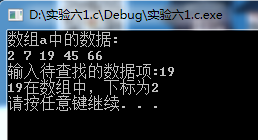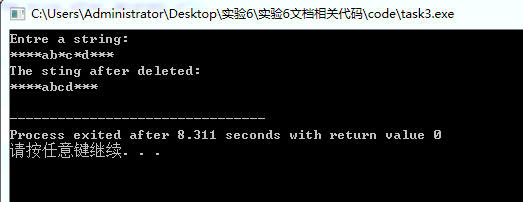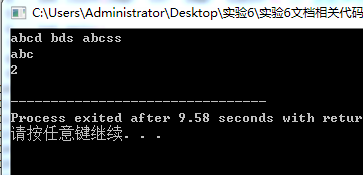#include<stdio.h>
#include<stdlib.h>
#define N 5
int binarySearch(int *x,int n,int item);
int main()
{
int a[N]={2,7,19,45,66};
int i,index,key;
printf("数组a中的数据:\n");
for(i=0;i<N;i++)
printf("%d ",a[i]);
printf("\n");
printf("输入待查找的数据项:");
scanf_s("%d",&key);
index=binarySearch(a,N,key);
if(index>=0)
printf("%d在数组中,下标为%d\n",key,index);
else
printf("%d不在数组中\n",key);
system("pause");
return 0;
}
int binarySearch(int *x,int n,int item)
{
int low,high,mid;
low=0;
high=n-1;
while(low<=high)
{
mid=(low+high)/2;
if(item==*(x+mid))
return mid;
if(item<*(x+mid))
high=mid-1;
if(item>*(x+mid))
low=mid+1;
}
return -1;
}
![]()
#include <string.h>
#include <stdio.h>
#include <stdlib.h>
void fun(char *a)
{
/*****ERROR********/
int i=0;
char *p = a;
/****ERROR***/
while (*p && *p == '*')
{
a[i] = *p;
i++;
p++;
}
while (*p)
{
/******ERROR*******/
if (*p != '*')
{
a[i] = *p;
i++;
}
p++;
}
/******ERROR*******/
a[i] = '\0';
}
int main()
{
char s[81];
printf("Enter a string :\n");
gets(s);
/***ERROR******/
fun(s);
printf("The string after deleted:\n");
puts(s);
return 0;
}
![]()
#include <stdio.h>
#include <stdlib.h>
#include <string.h>
void fun(char *a)
{
/**ERROR******/
int i=0;
char *t = a, *f = a;
char *q = a;
while (*t)
t++;
t--;
while (*t == '*')
t--;
while (*f == '*')
f++;
/***ERROR***/
while (q < f)
{
a[i] = *q;
q++;
i++;
}
while (q < t)
{
/***ERROR**/
if (*q != '*')
{
a[i] = *q;
i++;
}
q++;
}
while (*q)
{
a[i] = *q;
i++;
q++;
}
/**ERROR**/
a[i] = '\0';
}
int main()
{
char s[81];
printf("Entre a string:\n");
gets(s);
/**ERROR**/
fun(s);
printf("The sting after deleted:\n");
puts(s);
return 0;
}
![]()
#include <stdio.h>
#include <string.h>
#define N 80
int isPalindrome(char *s); // 函数声明
int main()
{
char str[N];
int flag;
printf("Enter a string:\n");
gets(str);
flag = isPalindrome(str); // 函数调用
if (flag)
printf("YES\n");
else
printf("No\n");
return 0;
}
// 函数定义
// 功能:判断指针s指向的字符串是否是回文串,如果是,返回1;否则,返回0。
int isPalindrome(char *s)
{
char *a,*b;
a=s;
b=s+strlen(s)-1;
while(a<b)
{
if(*a==*b)
{
a++;
b--;
}
else
return 0;
}
if(a>=b)
return 1;
}
![]()
#include <stdio.h>
#define N 80
int count(char *str, char *substr); // 函数声明
int main()
{
char str[N], substr[N];
int n;
gets(str); // 输入母串
gets(substr); // 输入子串
n = count(str, substr); // 函数调用
printf("%d\n", n);
return 0;
}
int count(char *str, char *substr)
{
int i, j, k;
int num = 0;
for(i=0;str[i]!='\0'; ++i)
for(j=i, k=0; substr[k] == str[j]; k++, j++)
if(substr[k+1] == '\0')
{
num++;
break;
}
return(num);
}
![]()







 浙公网安备 33010602011771号
浙公网安备 33010602011771号